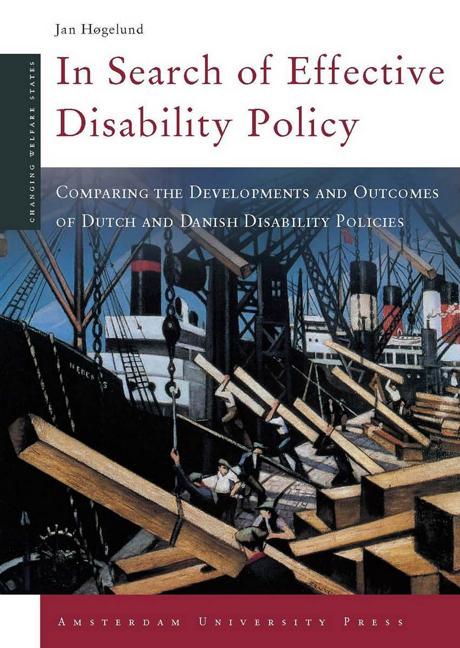 In Search of Effective Disability Policy
In Search of Effective Disability Policy Book contents
- Frontmatter
- Contents
- Acknowledgement
- 1 Disability Policies Under Pressure
- 2 The Integration of Disabled People:What Do We Know?
- 3 Bringing the Pieces Together:A Multidisciplinary Approach to Work Disability
- 4 Economic Miracles Bypassing Disabled People
- 5 Dutch Disability Reforms:Redefining Responsibilities
- 6 Danish Disability Policy:Small Steps,Big Change?
- 7 Different Routes to Integration
- 8 Different Policies – Different Outcomes
- 9 Too Much and Too Little:Employers’Responsibility in Denmark and the Netherlands
- Tables and Figures
- Notes
- References
- Index of Subjects
- Index of Names
7 - Different Routes to Integration
Published online by Cambridge University Press: 15 January 2021
- Frontmatter
- Contents
- Acknowledgement
- 1 Disability Policies Under Pressure
- 2 The Integration of Disabled People:What Do We Know?
- 3 Bringing the Pieces Together:A Multidisciplinary Approach to Work Disability
- 4 Economic Miracles Bypassing Disabled People
- 5 Dutch Disability Reforms:Redefining Responsibilities
- 6 Danish Disability Policy:Small Steps,Big Change?
- 7 Different Routes to Integration
- 8 Different Policies – Different Outcomes
- 9 Too Much and Too Little:Employers’Responsibility in Denmark and the Netherlands
- Tables and Figures
- Notes
- References
- Index of Subjects
- Index of Names
Summary
The Dutch and Danish disability policies differ with respect to with whom the responsibility for labour market integration of sick-listed workers rests. The responsibility of employers is much more extensive in the Netherlands than in Denmark, and vice versa with regard to the responsibility of public authorities. Workers’ income protection during sick leave constitutes another difference: Dutch workers generally seem to enjoy better income protection during sick leave than Danish workers. This and the following two chapters shed light on how these differences influence the labour market integration ofwork-disabled people.
Extensive employer responsibility makes it costly and difficult for employers to substitute sick-listed workers. Compared to the Danish policy, we should, therefore, expect that the Dutch policy will enhance the labour market attachment of disabled workers. But we should also anticipate that the Dutch policy makes labour market entry difficult for disabled people without attachment to an employer, because employers will be reluctant to recruit people whom they expect have high sickness absenteeism rates. In contrast, the Danish policy stresses a public responsibility for the integration of disabled people. In this respect an extensive public supply of vocational rehabilitation measures is an integrated part of Danish policy. Consequently, we should expect that in Denmark disabled peoples’ labour market integration will often be facilitated by such measures.
This chapter seeks to uncover to what extent these institutional differences exist, and how they influence the mechanisms through which labour market integration takes place. Does the solid job-protection legislation in the Netherlands reduce dismissals of sick-listed workers? Does the extensive responsibility of employers increase their efforts in integrating sick-listed workers? Similarly, does the formal emphasis on publicly supplied vocational rehabilitation in Denmark lead to more disabled people participating in such measures? How these differences affect labour market integration of disabled people is studied in the next chapter.
The empirical analyses rest to a large extent on data from a crossnational study of long-term sick-listedworkers.These data are briefly described in the next section. In the proceeding sections the consequences of crossnational differences in job-protection legislation, the supply of vocational rehabilitation measures, and income protection during sick leave are discussed.
- Type
- Chapter
- Information
- In Search of Effective Disability PolicyComparing the Developments and Outcomes of the Dutch and Danish Disability Policies, pp. 111 - 134Publisher: Amsterdam University PressPrint publication year: 2003


